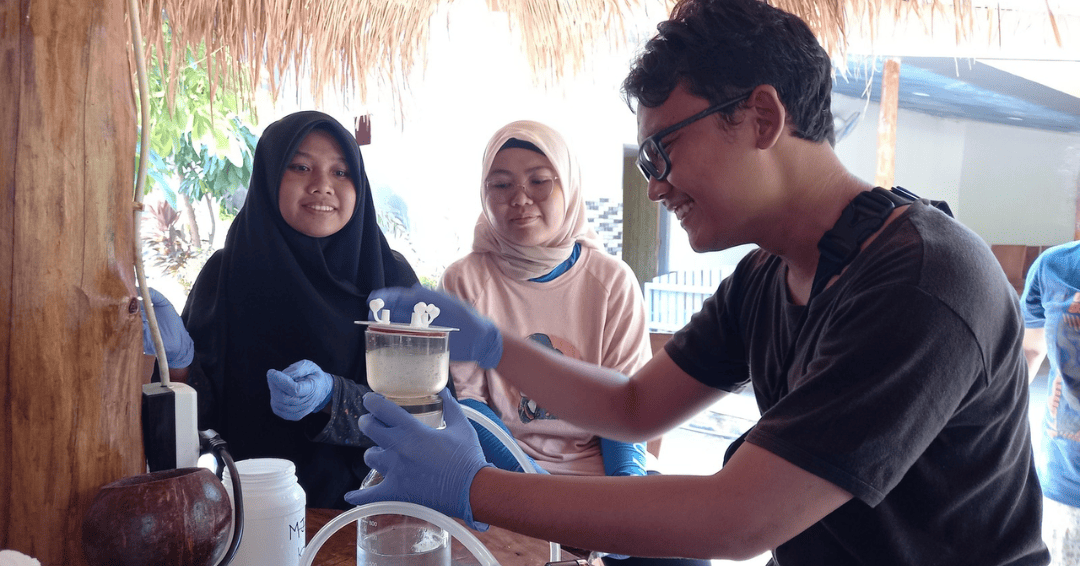Project title: JALAKARANG “Jejaring Analisis Larva dan Karang” as a transforming Coral Spawning Monitoring through eDNA and Citizen Science
Lead applicant: Dr. Ni Kadek Dita Cahyani
Co-applicants: Prof. Diah Permata Wijayanti, Dr. Danwei Huang
Countries involved: Indonesia, Singapore
Takes place: Karimunjawa Islands (Indonesia)
Supporting institutions: Universitas Diponegoro, National University of Singapore
Total budget:USD 98,230
Duration: 24 months
Project overview
The Karimunjawa Islands, one of Indonesia’s oldest national parks, host some of the most vibrant coral reef ecosystems in the Java Sea. These reefs rely heavily on biannual coral spawning events and strong larval connectivity among the islands to sustain their resilience and biodiversity. However, current monitoring methods are limited and time-consuming, making it difficult to fully understand coral spawning dynamics — knowledge that is critical for guiding effective restoration and conservation strategies.
This project introduces a cutting-edge monitoring approach using environmental DNA (eDNA), combining a portable DNA laboratory (Bento Lab) to amplify and visualize samples with a portable DNA sequencer (ONT MinION) to identify species in real time. These method allows researchers to rapidly detect multiple taxa—including corals, fish, and invertebrates—from a single sample, providing real-time, non-invasive insights during short coral spawning events. By applying this technology in the Karimunjawa Islands, the team aims to generate comprehensive data on coral larval dispersal and ecosystem dynamics, which will directly inform reef restoration and management efforts.
In addition, the project will engage the local community through citizen science, enabling participants to assist with data collection and coral spawning monitoring. This integrated approach not only advances scientific understanding but also builds local capacity and awareness, ensuring long-term stewardship of these fragile and invaluable reef ecosystems.
Specific objective
- Enhance the reliability of detecting coral taxa and biodiversity associated with coral spawning events.
- Deploy a citizen-science platform which will serve as a centralized repository for coral spawning reports across Indonesia.
How the objectives will be met
Enhance the reliability of detecting coral taxa and biodiversity associated with coral spawning events:
- Train students to use of eDNA, ONT MinION and Bento Lab protocols.
- Monitoring coral spawning events twice a year (March-April; September-October)
- Collect eDNA samples, and developing protocols tailored to Indonesian laboratory conditions.
- Organize a workshop involving key stakeholders such as national park authorities, local fishers, and students to raise awareness on corals and to introduce the use of ONT MinION technology.
Deploy a citizen-science platform:
- Replicate the developed protocols in other regions.
- Host a workshop focused on data storage, laboratory methods, and bioinformatic analysis.
Impact of the project
- New techniques to monitor coral spawning events are implemented in Indonesia.
- Local stakeholders from Karimunjawa Islands are trained in coral spawning monitoring and molecular tools.
- Development of an online citizen science platform to register coral spawning sightings across Indonesian waters.
- Implementation of a capacity-building course for citizen scientists on the online platform.
- Sampling eDNA from 5-7 coral spawning sites across Indonesia in collaboration with nearby citizen scientists.
Major highlights
- The citizen science program will foster community engagement and ownership, educating the public and raising awareness on the coral crisis, while also lowering operational costs of monitoring coral spawning in Indonesia.
- Provides relevant and practical data that can support the work of local conservation practitioners.

